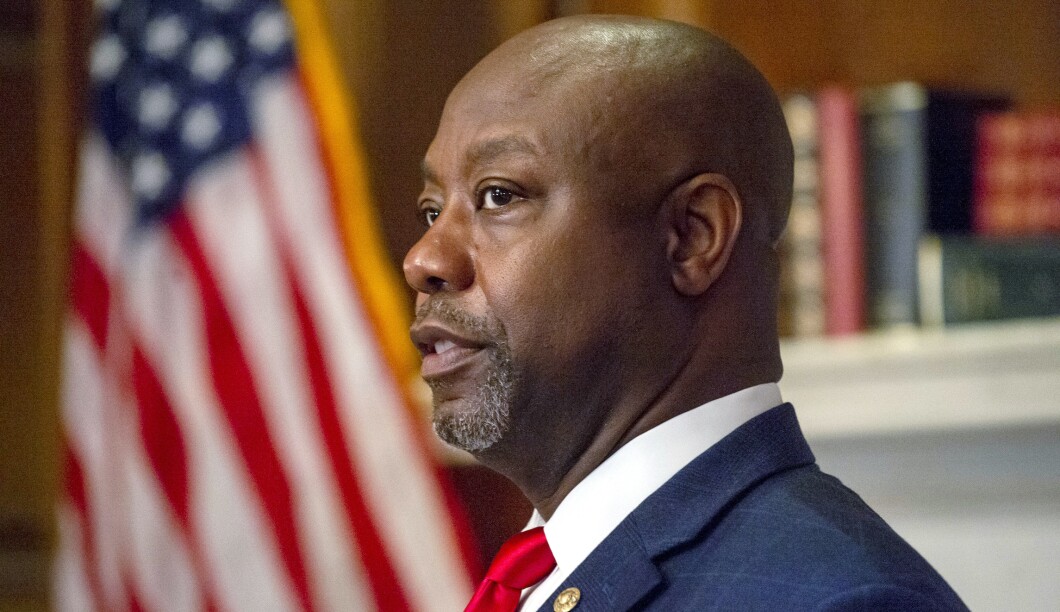
Sen. Tim Scott (R-SC) announced Wednesday that he is launching a 2024 exploratory committee, the first step toward running for president.
Scott, 57, is testing whether to join a Republican presidential field dominated by former President Donald Trump. It also includes former United Nations Ambassador Nikki Haley, a fellow South Carolinian and former governor of that state, entrepreneur Vivek Ramaswamy, and former Gov. Asa Hutchinson (R-AR).
Gov. Ron DeSantis (R-FL) and former Vice President Mike Pence are also widely believed to be considering runs. DeSantis is likely to make a decision by the conclusion of the Florida legislative session next month.
Scott’s travel itinerary strongly suggested he was taking a look at the race. He is headed to Iowa and New Hampshire, the first two states on the Republican primary calendar, before heading to a summit in his native South Carolina, which will also come early.
An exploratory committee would allow Scott to fund that travel as well as polling to test his viability. He would then be able to transfer the money to a campaign if he entered the Republican nomination contest.
Scott was first elected to the Charleston city council in 1995, serving multiple terms and becoming chairman in 2007. He was elected to the lower house of the state legislature in 2008, serving two terms.
In 2010, Scott won a competitive Republican primary for Congress, defeating the sons of two former governors: Paul Thurmond, whose father was also a longtime U.S. senator from South Carolina, and Carroll A. Campbell III. Scott and Thurmond went to a runoff, which the former won by more than 30 points. Scott went on to win the general election, becoming the first black Republican elected to Congress from South Carolina in over 100 years.

Scott was reelected in 2012, this time running unopposed in the Republican primary and beating the Democrat by more than 30 points. But he didn’t stay long. Haley, then governor of South Carolina, appointed him to fill the vacancy created when Sen. Jim DeMint (R-SC) stepped down to become president of the Heritage Foundation, a conservative think tank.
That appointment made Scott the first black senator from South Carolina, the first black Republican senator since Sen. Edward Brooke (R-MA) was defeated for reelection in 1978, and the first black Southern senator since Reconstruction. There were two periods in 2013 when Scott was the only African American member of the Senate.
Scott would go on to win an election to the final two years of DeMint’s term in 2014, which was also the year Republicans finally captured the Senate under former President Barack Obama. Scott was reelected to full terms in 2016 and 2022. In 2021, he delivered the Republican response to President Joe Biden’s first address to a joint session of Congress, receiving generally positive reviews.
A conservative, Scott has been active in police reform negotiations with Senate Democrats and helped pass criminal justice reform legislation under former President Donald Trump. Though he and Haley initially supported Sen. Marco Rubio (R-FL), presenting an image many hailed as that of a new diverse GOP, Scott skillfully navigated the Trump years.
If Scott were to seek the GOP presidential nomination, he would be the highest-ranking black official to do so. Alan Keyes and Arthur Fletcher were assistant Cabinet secretaries under Ronald Reagan and Richard Nixon, respectively. Herman Cain was a businessman and prominent spokesman for conservative causes. Ben Carson was a neurosurgeon and author who became secretary of housing and urban development under Trump.
Colin Powell, the former chairman of the Joint Chiefs of Staff under George H.W. Bush and national security adviser to Reagan, who became secretary of state under George W. Bush, was touted as a possible candidate for the 1996 Republican presidential nomination but never ran.
“My grandfather voted for the first man of color to be reelected as president of the United States,” Scott said at his victory rally last year. “I wish he lived long enough, long enough to see perhaps another man of color — and this time, vote for a Republican and not a Democrat.”
A presidential run would also put Scott at odds with his erstwhile ally Haley. The two share donors and supporters in common, as did Floridians Rubio and Jeb Bush in 2016, and would both presumably look to South Carolina as a launching pad for their campaigns.
The South Carolina primary proved decisive to the nominations of the elder Bush in 1988, Bob Dole in 1996, the younger Bush in 2000, John McCain in 2008, and Trump in 2016, though a win there did little to boost Newt Gingrich in 2012.
Sen. Lindsey Graham (R-SC) was unable to parlay his status as the Palmetto State’s senior senator into a workable presidential candidacy in 2016. He dropped out before the first votes were cast in late 2015, ultimately becoming a Trump ally.
Haley wouldn’t be Scott’s only obstacle. He received 0.8% of the vote in the RealClearPolitics average of national polls, good for 10th place behind such longshots as former Rep. Liz Cheney (R-WY) and former Gov. Chris Christie (R-NJ).
Scott wasn’t included in the most recent Reuters poll and received 1% in a Trafalgar poll. He would enter what is so far predominantly a Trump-DeSantis contest, assuming the Florida governor eventually declares, with considerable ground to make up. Trump leads in the current national polling, but the picture in the early states is murkier.
CLICK HERE TO READ MORE IN THE WASHINGTON EXAMINER
Scott is viewed as a skilled orator with an inspiring story. During his politically formative years, he won the support of Tea Party groups and the Club for Growth.
“If you want to understand America, you need to start in Charleston; you need to understand and appreciate the devastation brought upon African Americans,” Scott said in February. “But if you stop at our original sin, you have not started the story of America because the story of America is not defined by our original sin. The story of America is defined by our redemption.”





